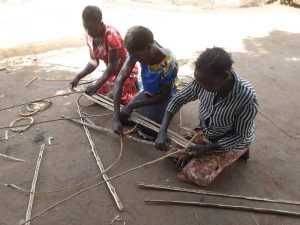Bee The Voice ( BeeTV )
- Background Information:
- Name of the CSO/NGO- The Uganda National Apiculture Development Organization (TUNADO)
- Main activity/ thematic area: Apiculture sector/ Beekeeping
- Agricultural enterprises supported: Jephina Bee products Ltd
- Category of farmers supported/ targeted: Beekeepers, Honey processors and packers
- Proposed coverage / name of sub county: Itirikwa, Pakele, Adropi, Ofuwa
- About the Project:
A needs assessment carried out by TUNADO and her partners showed that;
- The feminisation of poverty and patriarchal socio-economic systems affect the ability of women and girls to equally benefit from beekeeping, alongside their male peers. This is particularly true of young women, women with disabilities.
- 21% of Ugandan live in poverty and 43% depend on subsistence agriculture for their livelihoods. 80% of youth are under-employed or unemployed, with the rate higher for young women than men. As a result of Covid-19, many people returned to agriculture and other natural resources dependent activities to survive.
- Women’s roles and responsibilities often mean the benefits of beekeeping are more likely to accrue to men, despite the involvement of women beekeepers.
- There are gender based barriers to women and girls obtaining the knowledge and confidence in beekeeping, and the business skills and access to finance to start and grow their beekeeping operations or have more say in family apiaries.
- Changes in gender norms, roles and responsibilities have to be negotiated and embedded by both men and women to be sustainable.
- Leadership and expertise in the field of beekeeping is dominated by men.
There is therefore a need to:
- Encourage women to take up non-traditional roles in beekeeping and strengthen their ability to benefit equally as male beekeepers.
- Negotiate change within households and communities so that women’s roles in beekeeping are understood and accepted.
- Upskill women and girls in both beekeeping, financial and business skills.
- Link women (and men) beekeepers to markets for their products.
- Encourage women beekeepers to become leaders in the field of beekeeping through TUNADO’s national-level Apiary Master Programme.
- Project Approach:
The project has three main approaches:
Firstly, it will use a participatory community capacity building methodology (Gender Action Learning System (GALS)) to build the targets community understanding and addressing gender based barriers that prevent men and women benefiting equally from beekeeping. The aim of the Gender Action-Learning process is to improve the ability for men and women to work together and to learn from each other in achieving their economic goals from beekeeping. It will promote women’s empowerment and gender equality through addressing institutional norms and rules (both stated and implicit) that maintain women’s unequal position in the Honey and Beeswax Value Chain in Adjumani District.
Secondly, the project will build the capacity of 10 women beekeeping Apiary Champions to conduct extension services (targeting a further 100 women beekeepers and their families) in the district. This activity aims to challenge gender norms in beekeeping in the target communities at the same time as increasing and improving extension services to women (and men) beekeepers in the District.
Finally the project will mobilise, train, and certify 10 women Apiary Masters. This aims to increase the number and visibility of women in both technical and policy leadership of the sector. These women will act as role models for other women beekeepers, and supported by TUNADO to seek out better employment opportunities in the beekeeping sector.
- The Project will deliver three Outputs:
- 110 women are better able to realise the benefits of beekeeping and make decisions about the income earned from honey selling.
- 10 women Beekeeping Champions achieve respected positions within their communities, as beekeeping mentors, as agents of the local honey company and as resource persons in achieving gender justice within the Honey and Beeswax Value Chain in Adjumani.
- 10 women achieve the status of Apiary Masters, giving them stronger employment opportunities in the beekeeping sector.



